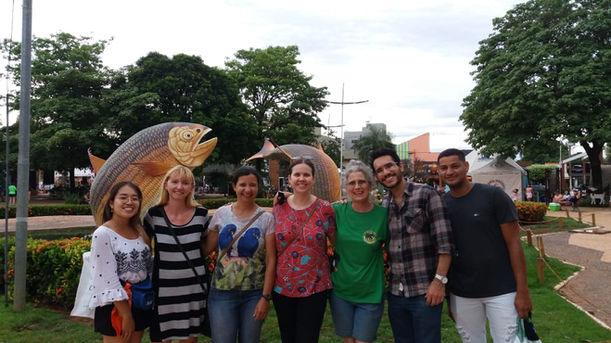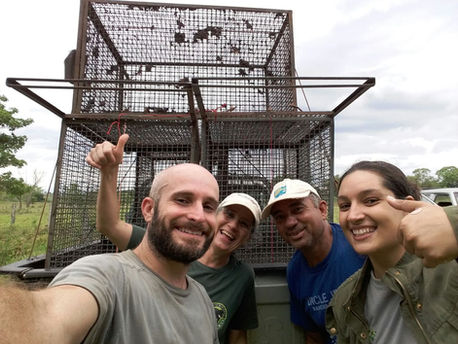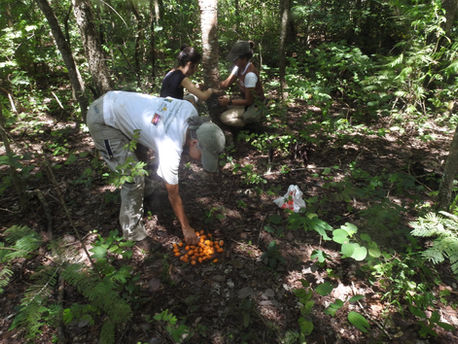Team and Volunteers








About our Team
.jpeg)
Coordinator, wildlife ecologist and conservation biologist
Alexine Keuroghlian
I am the coordinator of a cooperative interdisciplinary research group conducting long-term investigations of white-lipped peccary (T. pecari) ecology, behavior and population genetics, as well as interbiome comparisons of movements and range use in relation to landscape patterns and disturbances. Our goals are to increase understanding about the species, address threats, engage rural communities in conservation efforts and develop strategies that protect populations in the Pantanal, Cerrado and Atlantic Forest. The Peccary Project includes researchers from Vanderbilt University, UNESP - Rio Claro (São Paulo State University), UFMS (Federal University of Mato Grosso do Sul), UFABC (Federal University of São Paulo, ABC) and Wofford College.

Scientific Coordinator
Maria Luisa SP Jorge
Maria Luisa Jorge, Ph.D., serves as an Associate Professor in Earth & Environmental Sciences at Vanderbilt University. Known as Malu, her work primarily involves spatial ecology, ecological modeling, and the application of geotechnologies in conservation biology. Most of her field research has been conducted in Brazil, focusing on landscape habitat suitability patterns and the conservation of white-lipped peccaries, tapirs, and jaguars. Since 2009, Malu has been dedicated to research with similar conservation goals in the Pantanal and Cerrado, collaborating closely with the Peccary Project. Her research involves the analysis and modeling of range use and movements of white-lipped peccaries in various areas throughout the southern Pantanal and Cerrado. These areas differ with respect to levels of disturbance and other environmental features. Maria Luisa Jorge's research contributions highlight her commitment to understanding and promoting the conservation of key wildlife species in Brazil.

Scientific Coordinator
Cibele
Cibele Biondo Cibele Biondo, Ph.D., is an Associate Professor at the Center for Natural and Human Sciences at the Federal University of ABC. She is actively engaged in research projects focusing on the areas of behavior, evolution, and molecular ecology of mammals. Alongside her graduate students and collaborators, she conducts population genetics studies of white-lipped peccary herds, collaborating with the University of Sao Paulo (UNESP/USP). Additionally, Cibele is currently leading the Brazilian National Ungulate Conservation Action Plan (PAN - Ungulados, ICMBio/CENAP) initiative.

Project Advisor
Donald Eaton
Donald P. Eaton holds a Ph.D. in Ecology, Evolution, and Conservation Biology from UNR. He served as the scientific coordinator, conservation biologist, and aquatic ecologist for the WCS Brazil Pantanal/Cerrado program in Mato Grosso do Sul, Brazil, focusing primarily on sustainable land use and conservation of aquatic environments in the Pantanal and the bordering Cerrado highlands of central-western Brazil. His Ph.D. thesis, titled "Assessing ecological communities in the wake of ongoing land use change in the Atlantic Forest and Pantanal of Brazil," included a study on the impact of cattle on native mammals and birds visiting fruiting trees in southern Pantanal forests. Over the past 20 years, Don has collaborated with the Peccary Project, where he coordinated GIS analyses, compiled databases for research, conducted statistical analyses, and examined aquatic communities (important peccary habitats in the Pantanal) in relation to land use changes and the introduction of sustainable practices. Currently, Don serves as an invertebrate aquatic ecologist for the Department of Natural Resources in Minnesota.

Researcher
Julia Oshima
Julia Oshima completed her Ph.D. at Universidade Estadual Paulista (UNESP) in Rio Claro, with her thesis focusing on the ecology of movement, habitat use, distribution, and conservation of white-lipped peccaries. This research included the measurement of landscape metrics, such as the level of fragmentation and connectivity throughout their biogeographical range. With a strong interest in ecology, Julia is dedicated to studying the impact of environmental changes over time and space on the conservation of animal species. Currently, she collaborates with the National Action Plan for Ungulates of ICMBio and the IUCN SSC Peccary Specialist Group. Julia is currently pursuing her post-doc with the Movement Ecology lab at IB/USP.

PHD Candidate
Mozart Savio
I have been part of the Peccary Project for nine years. I started as an intern during my undergraduate studies in biology, where I participated in environmental education initiatives. Later, I pursued a master's degree, evaluating population genetics. Currently, I am conducting my doctoral research with the aim of reintroducing herds to areas where populations have been extinct. My participation in this project has been essential for my academic and personal development, providing the necessary motivation to achieve my goals.

Researcher
Michaela Peterson
I’ve been examining how white-lipped peccaries respond behaviorally to temperature variation, in order to predict how they’ll be impacted by future climate change. I’ve found that peccaries in the Pantanal are very flexible in their temporal activity patterns, and become more nocturnal on days with high maximum temperatures.

Project assistant
Sean Keuroghlian-Eaton
I have been a part of the Peccary Project for over 10 years, contributing to field research and camera trap analysis. Currently, I am studying the ecological interactions between areas that have been ecologically engineered by peccaries and how that affects frog pópulations. Peccaries, serving as an umbrella species for many fauna and flora, prompt us to explore more connections with other species sharing the same ecosystem.

Vanderbilt Graduate Student
Lilly Quach
My involvement in the peccary project included mapping the surrounding landscapes, setting up camera traps, tracking their activity, and identifying species records

Researcher
Fernanda Maciel
My involvement includes researching genetic diversity and population structure of white-lipped peccaries.

Researcher
Gabriela Schmaedecke
Her doctoral project focused on conservation genetics and landscape ecology of white-lipped peccaries in the Atlantic Forest, Cerrado, and Pantanal. Currently, she works at CENAP/ICMBio as an internal collaborator and technical-scientific assistant, contributing to public policies aimed at evaluating the conservation status of Brazilian wildlife species threatened with extinction.

Pró-Tapir coordinator
Andressa Gatti
Andressa is the creator and coordinator of the Pró-Tapir program. She has extensive experience in field Ecology, Management, and Conservation of Wildlife. Since 2000, she has been involved in various research and conservation projects, especially with medium and large-sized mammals. Her areas of interest include wildlife conservation, management, and ecology, as well as sustainability.

Researcher
Jennifer Bradham
A graduate of Vanderbilt University, currently holds the position of Assistant Professor in the Environmental Studies Department at Wofford College. Her research included analyzing and modeling white-lipped peccary movement patterns and understanding their correlation with environmental factors and landscape features. Jennifer conducted extensive research on the movement patterns of white-lipped peccaries from the Pantanal and Cerrado regions, exploring their impact on forest plant communities and other wildlife. Additionally, she investigated how large mammals adapt their diet spatially and temporally in response to land use changes in Central Brazil.

Field assistant
Edivaldo Oliveira de Souza
Edivaldo received his MS in Ecology from UFMS and is a guide, field assistant, and an exceptional ornithologist. He assists the Peccary Project with long-term monitoring data collection.

UFABC Graduate Student
Gabrielle Naomi Imai Aldeia
Gabriele is in the final phase of her MS degree with Dr. Biondo at UFABC. She is analyzing peccary behavior and landscape features from camera trap videos.
